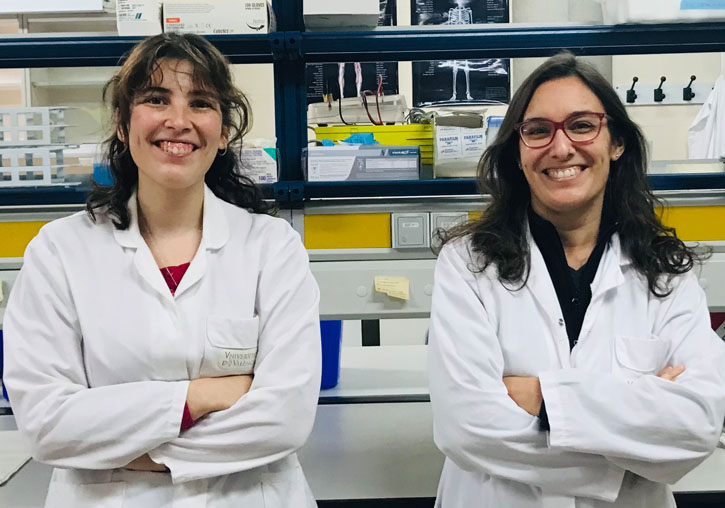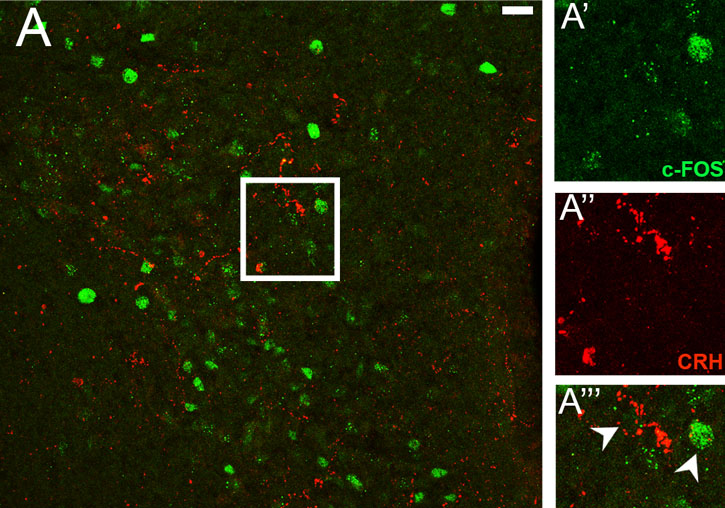The effects of early stress on anxious behaviour investigated in a mouse model of Rett syndrome
- Scientific Culture and Innovation Unit
- December 22nd, 2021

María Abellán-Álvaro and Carmen Agustín-Pavón, from the Joint Research Unit in Functional Neuroanatomy of the University of Valencia, have analysed in mice the interaction of stress during early childhood with the deficiency of the MECP2 gene, to know the consequences of both factors on the expression of anxiety during adolescence. Mutations in this gene are the main cause of Rett syndrome, a rare disease that affects neurological development, mainly in girls, and that causes motor and intellectual disability, loss of speech and epilepsy, among other symptoms.
A study carried out in young female mice deficient for the MECP2 gene has confirmed that these animals show very significant alterations in the expression of anxious behaviour, when compared with healthy females, despite being considered still presymptomatic. These disturbances in anxious behaviour were similar to those shown by healthy mice that were subjected to moderate early stress, separating them for three hours a day from their mothers while they were lactating. In this way, the key role of the MECP2 gene during postnatal development in later disturbances in anxiety behaviour is confirmed.
“Both the MECP2-deficient animals and their healthy controls that were subjected to maternal separation during early childhood showed, during the performance of a test that induces anxiety at an age comparable to human adolescence, less anxious behaviour and less activation of neurons that secrete corticotropin-releasing hormone (CRH, which controls the release of stress hormones). These results show that the neuroendocrine stress control system is altered both by the deficiency in MECP2 and by adverse conditions during early development”, indicated Carmen Agustín-Pavón, doctor in Neuroscience from the University of Valencia and professor of the Department of Cell Biology, Functional Biology and Physical Anthropology.
This work, the first research that addresses the consequences of stressful early manipulations in the Rett model, aims to delve into the factors that contribute to alterations in anxiety suffered by girls and women with Rett syndrome, with the aim of finding new therapeutic targets for symptom improvement. In this sense, the data have confirmed the CRH pathway as a potential entry point for the treatment of anxiety in Rett syndrome and related disorders.
The study, led by Mónica Santos, from the Centre for Neuroscience and Cell Biology at the University of Coimbra (Portugal) and with the collaboration of Oliver Stork, from the Otto von Guericke University in Magdeburg (Germany), has been published in the Journal of Neurodevelopmental Disorders. The study was funded by the 2019 FinRett Grants for Rett Syndrome Research, the Jérôme Lejeune Foundation, and the Ministry of Science and Innovation of Spain.
Article: Abellán-Álvaro, M., Stork, O., Agustín-Pavón, C. et al. «MeCP2 haplodeficiency and early-life stress interaction on anxiety-like behavior in adolescent female mice». Journal of Neurodevelopmental Disorders 13, 59 (2021) https://doi.org/10.1186/s11689-021-09409-7
Photo caption:
- Microphotograph showing neural activity (measured as expression of the early c-Fos gene product, in green) in CRH-positive neurons (marked in red) of the hypothalamic paraventricular nucleus in a MECP2-deficient mouse.
File in: Internacionalització recerca , Facultat de Ciències Biològiques , Biologia Cel·lular, Biologia Funcional i Antropologia Física , Grups de recerca , Difusió i comunicació científica , Producció científica , Investigació a la UV


















